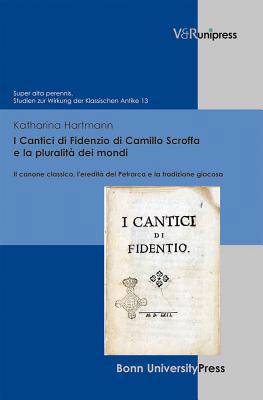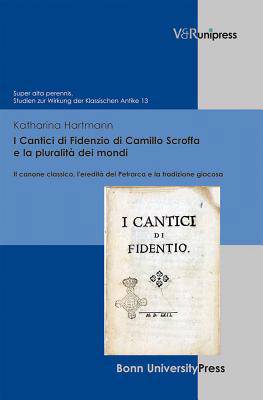
Bedankt voor het vertrouwen het afgelopen jaar! Om jou te bedanken bieden we GRATIS verzending (in België) aan op alles gedurende de hele maand januari.
- Afhalen na 1 uur in een winkel met voorraad
- In januari gratis thuislevering in België
- Ruim aanbod met 7 miljoen producten
Bedankt voor het vertrouwen het afgelopen jaar! Om jou te bedanken bieden we GRATIS verzending (in België) aan op alles gedurende de hele maand januari.
- Afhalen na 1 uur in een winkel met voorraad
- In januari gratis thuislevering in België
- Ruim aanbod met 7 miljoen producten
Zoeken
I Cantici Di Fidenzio Di Camillo Scroffa E La Pluralita Dei Mondi
Katharina Hartmann
Hardcover | Duits
€ 109,95
+ 219 punten
Omschrijving
In the sixteenth-century Cantici di Fidenzio, unhappy teacher Fidenzio sings of his disastrous love for one of his students. As may be expected of a Renaissance teacher of Latin, he drew on both ancient and contemporary literary models, from Virgil over Petrarch to Berni, in order to enhance his homosexual desire and his poems with appropriate auctoritas. Fidenzio's language (a morpho-syntactical mix of Latin and Italian), the exaggerated expectations, and the implied consequences cannot easily be understood from the perspective of today's readers: for the contemporary audience the Cantici, teeming with citations and allusions, certainly were a hilarious read, we today need further explanations in order to fully grasp the meaning of Fidenzio's verses. For the first time, this study offers a bridge into the Cantici's world and allows a more wholesome understanding of this great work of the Italian Renaissance.
Specificaties
Betrokkenen
- Auteur(s):
- Uitgeverij:
Inhoud
- Aantal bladzijden:
- 276
- Taal:
- Duits
Eigenschappen
- Productcode (EAN):
- 9783899719772
- Verschijningsdatum:
- 1/03/2013
- Uitvoering:
- Hardcover
- Formaat:
- Genaaid
- Afmetingen:
- 167 mm x 245 mm
- Gewicht:
- 603 g

Alleen bij Standaard Boekhandel
+ 219 punten op je klantenkaart van Standaard Boekhandel
Beoordelingen
We publiceren alleen reviews die voldoen aan de voorwaarden voor reviews. Bekijk onze voorwaarden voor reviews.









